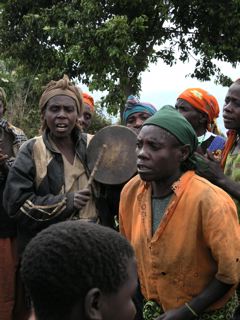
Phrases and images concerning the Batwa
Carl Söderbergh, MRG’s Director of Policy and Communications, reflects on a visit to a Batwa community in Uganda
As the plane circled over London, preparing to land, and I peered bleary-eyed over the web of streets below, my thoughts turned to the encounters and conversations of the past week. My MRG colleagues Eva, Kathryn, Paul and I had visited southern Uganda in order to conduct a gender training for members of Batwa communities in the Great Lakes region. What came back to me in my jet-lagged state were stray comments that reflected much of what the Batwa confront today.
We had spent a day visiting Rwamahano, a Batwa settlement lying at the end of a breath-taking drive along a narrow dirt track winding around wooded ridges followed by a hike straight up a hill-side. The village comprised approximately 60 families: Batwa who had been forcibly evicted when the Echuya forest reserve was established in 1991. As a constant reminder of what the Batwa have lost, the forest begins just on the other side of the road we had been driving along, a seemingly impenetrable tangle of green. The settlement had been established on a strip of land purchased by a charity and MRG partner organization, African International Christian Ministry (AICM).
The visit was a real eye-opener for me. I recalled the thrill, as a keen teen-aged zoology buff, of watching films in the 1970’s about mountain gorillas. To me then it seemed self-evident that their fragile ecosystem had to be preserved. Now I could see and hear about the considerable human cost at which this has been attempted.

While other elders were gathering to sing and dance, I spoke with Simako, a Batwa elder. Simako explained that the eviction orders had already been passed in the 1960’s, but were only implemented in 1991. Ugandan security personnel arrived with no prior notice and used force to push Batwa out of the forest. The Batwa received no compensation, nor had any land been set aside for them. Ousted from the forest, the Batwa had no means of subsistence and were forced to beg, often being refused by members of other ethnic groups who would reply that, “We can’t eat from the same place.” Simako said that they were especially stigmatized because they had yet to wear anything other than the animal skins they had used in the forest. Later, I heard another elder add, “We were not considered human.”
I asked Simako whether anyone had been injured or killed during the evictions. This did not appear to be the case. Simako said, however, that “colleagues” had been killed during another time: “There had been a war.” In those few words, he encapsulated what must surely have been a terrifying time.
Simako said that the segregation had lessened over the years. Now there are even cases of inter-marriage between Batwa and individuals of other ethnic groups. However, lack of land is still a problem. And as the community do not have a history in the area, they do not always know where exactly the boundaries of others’ property go. Thus, Batwa often end up in bitter land disputes, facing particular difficulties as they do not have the money to work the legal system or pay the necessary fees.
Later, Timothy, who heads the local AICM office, said something that I also recalled when I sat in the plane, watching London spiralling beneath me. In the gender workshop, he said that men of other ethnic groups had taken to raping Batwa women, as “this is considered a cure for back-ache.” I could not believe that he actually meant that, so I asked Timothy if this really was the case. He assured me that it is. The phrase remains with me still, as a particularly horrible form of double discrimination.
We learned during the course of the workshop how the situation of the Batwa varies from country to country. One participant, a soft-spoken man whom I will call K, had come from South Kivu in the Democratic Republic of Congo. He described how he had received a text message one day during the past spring: “Your house has been burned down. Your brother has been kidnapped.”
It was the Interahamwe who were behind this, and K’s own personal tragedy was only one of many instances where Batwa now being caught in the cross-fire between the Hutu extremists and the Congolese army. K had been in Bukavu at the time. He rushed home only to find that all this had indeed happened and then to try to secure his brother’s release. Thankfully, after about a month, the brother managed to use his knowledge of the forest to escape at night from his captors. But the two men remain internally displaced, living in the offices of K’s organization in Bukavu.

Timothy explained that the singers were describing what life had been like in the forest: the greenery, the animals and the wild fruits which they used to gather. Their last song, Timothy said, was one about hope, because the families of Rwamahano still remain positive about the future. I was struck by the inward gaze of the singers and the dancers. It became clear that the visitors were not the sole beneficiaries of this performance. The music and the songs – including that message of hope – were of course also directed at themselves.
—
This article reflects the sole opinion of its author and does not engage MRG’s responsibility.